Inversion倒装句
高二英语倒装 (Inversion) 语法讲解及专题练习
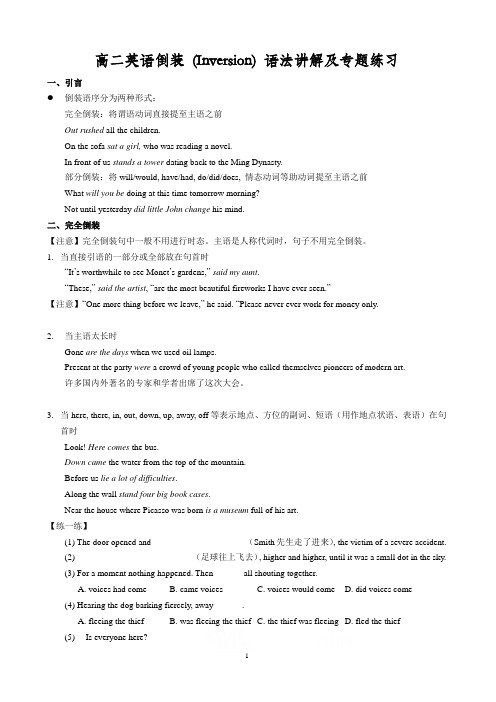
高二英语倒装(Inversion) 语法讲解及专题练习一、引言倒装语序分为两种形式:完全倒装:将谓语动词直接提至主语之前Out rushed all the children.On the sofa sat a girl, who was reading a novel.In front of us stands a tower dating back to the Ming Dynasty.部分倒装:将will/would, have/had, do/did/does, 情态动词等助动词提至主语之前What will you be doing at this time tomorrow morning?Not until yesterday did little John change his mind.二、完全倒装【注意】完全倒装句中一般不用进行时态。
主语是人称代词时,句子不用完全倒装。
1. 当直接引语的一部分或全部放在句首时“It’s worthwhile to see Monet’s gardens,”said my aunt.“These,”said the artist, “are the most beautiful fireworks I have ever seen.”【注意】“One more thing before we leave,” he said. “Please never ever work for money only.2. 当主语太长时Gone are the days when we used oil lamps.Present at the party were a crowd of young people who called themselves pioneers of modern art.许多国内外著名的专家和学者出席了这次大会。
____________________________________________3. 当here, there, in, out, down, up, away, off等表示地点、方位的副词、短语(用作地点状语、表语)在句首时Look! Here comes the bus.Down came the water from the top of the mountain.Before us lie a lot of difficulties.Along the wall stand four big book cases.Near the house where Picasso was born is a museum full of his art.【练一练】(1) The door opened and ______________________(Smith先生走了进来), the victim of a severe accident.(2) __________________________ (足球往上飞去), higher and higher, until it was a small dot in the sky.(3) For a moment nothing happened. Then ______ all shouting together.A. voices had comeB. came voicesC. voices would comeD. did voices come(4) Hearing the dog barking fiercely, away ______.A. fleeing the thiefB. was fleeing the thiefC. the thief was fleeingD. fled the thief(5) ---Is everyone here?---Not yet. Look, there ______ the rest of our guests!A. comeB. comesC. is comingD. are coming(6) From the window ______--- there must be a concert in the hall.A. sound of music cameB. came sound of musicC. did sound of music comeD. did come sound of music(7) There on the ground ______ a poor girl of sixteen years old.A. did layB. did lieC. laidD. lay(8) In the middle of the square ______ with a statue of a hero on top of it.A. stands a stoneB. does a stone standC. a stone standsD. a stone does stand(9) Between the two rows of trees ______ the teaching building, which ______ built in the 1990s.A. stands; wasB. stand; wasC. stands; wereD. stand; were(10) At the meeting place of the Yangtze River and the Jialing River ______, one of the ten largest cities inChina.A. lies ChongqingB. Chongqing liesC. does lie ChongqingD. does Chongqing lie(11)______ and the mouse was caught.A. Up the cat jumpedB. The cat up jumpedC. Up jumped the catD. Jumped up the cat4、such pron.“这样的人(或事物);上述的人(或事物)”Accountants were boring. Such was her opinion before meeting Ian.做会计的个个乏味。
特殊句式的类型
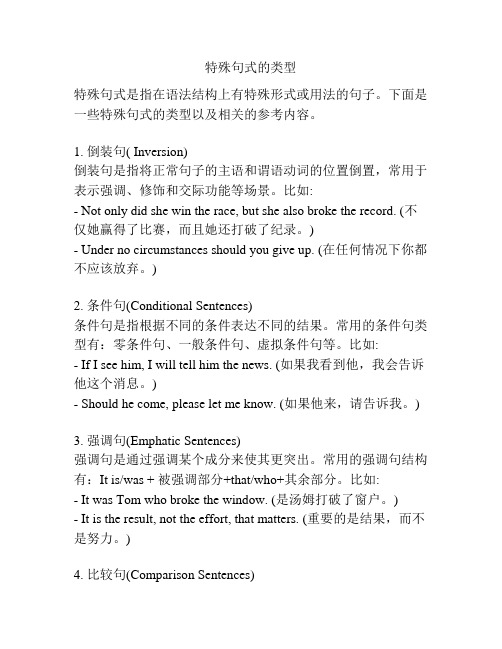
特殊句式的类型特殊句式是指在语法结构上有特殊形式或用法的句子。
下面是一些特殊句式的类型以及相关的参考内容。
1. 倒装句( Inversion)倒装句是指将正常句子的主语和谓语动词的位置倒置,常用于表示强调、修饰和交际功能等场景。
比如:- Not only did she win the race, but she also broke the record. (不仅她赢得了比赛,而且她还打破了纪录。
)- Under no circumstances should you give up. (在任何情况下你都不应该放弃。
)2. 条件句(Conditional Sentences)条件句是指根据不同的条件表达不同的结果。
常用的条件句类型有:零条件句、一般条件句、虚拟条件句等。
比如:- If I see him, I will tell him the news. (如果我看到他,我会告诉他这个消息。
)- Should he come, please let me know. (如果他来,请告诉我。
)3. 强调句(Emphatic Sentences)强调句是通过强调某个成分来使其更突出。
常用的强调句结构有:It is/was + 被强调部分+that/who+其余部分。
比如:- It was Tom who broke the window. (是汤姆打破了窗户。
)- It is the result, not the effort, that matters. (重要的是结果,而不是努力。
)4. 比较句(Comparison Sentences)比较句是用来比较两个对象或者描述相对关系的句子。
常用的比较句结构有:as+adj./adv. +as, not as+adj./adv.+as,more/less+adj./adv.+ than等。
比如:- He runs as fast as a cheetah. (他跑得像一只猎豹一样快。
Inversion倒装句课件+2023届高考英语复习

from your parents.
A. Here has a letter
B. Here is a letter
C. A letter is here
D. A letter here is
7.---I didn't like horror films. They' re terrible.
--- .
we'll have to walk home.
A. This
Байду номын сангаас
B. There
C. That
D. It
10.The man gave her a lift and away like a flash.
A the car goes
B. went the car
C. the car went
D. did the car go
correctly and properly
考纲要求
湖北技能高考对倒装句的能力要求
根据最新《湖北技能高考文化综合考试大纲(英语部分)》 及对近五年中职高考的分析,倒装考查的重点是“掌握全倒装 和半倒装的用法”。 要掌握倒装的用法,关键在于:掌握机构,灵活运用。
基本语序natural order
11.---As a member of Chinese, I am proud of my country.
Inversion 倒装句
language goals
Knowledge goal: Learn and master the full inversion(完全
倒装) & the partial inversion ( 半倒装) Ability goal: Improve the ability to use inversion
倒装句
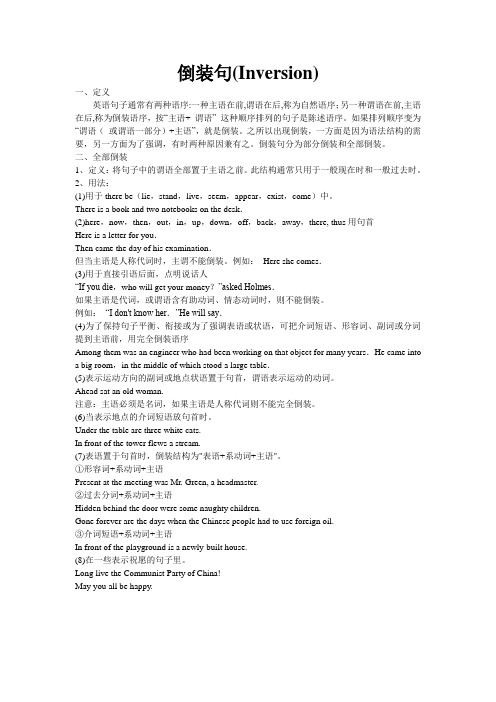
倒装句(Inversion)一、定义英语句子通常有两种语序:一种主语在前,谓语在后,称为自然语序;另一种谓语在前,主语在后,称为倒装语序,按“主语+ 谓语” 这种顺序排列的句子是陈述语序。
如果排列顺序变为“谓语(或谓语一部分)+主语”,就是倒装。
之所以出现倒装,一方面是因为语法结构的需要,另一方面为了强调,有时两种原因兼有之。
倒装句分为部分倒装和全部倒装。
二、全部倒装1、定义:将句子中的谓语全部置于主语之前。
此结构通常只用于一般现在时和一般过去时。
2、用法:(1)用于there be(lie,stand,live,seem,appear,exist,come)中。
There is a book and two notebooks on the desk.(2)here,now,then,out,in,up,down,off,back,away,there, thus用句首Here is a letter for you.Then came the day of his examination.但当主语是人称代词时,主谓不能倒装。
例如:Here she comes.(3)用于直接引语后面,点明说话人“If you die,who will get your money?”asked Holmes.如果主语是代词,或谓语含有助动词、情态动词时,则不能倒装。
例如:“I don't know her.”He will say.(4)为了保持句子平衡、衔接或为了强调表语或状语,可把介词短语、形容词、副词或分词提到主语前,用完全倒装语序Among them was an engineer who had been working on that object for many years.He came intoa big room,in the middle of which stood a large table.(5)表示运动方向的副词或地点状语置于句首,谓语表示运动的动词。
Inversion倒装句

1. There appeared to be a man in black in the distance.
2. There stands an old temple on the top of hill in front of the village.
4. There used to be a science museum in the city those days.
6. At no time did I say I would accept late homework. 7. Not a single word did she say. 8. Nowhere had Susan seen a more beautifully decorated room. 9.On no account should you be absent from your seminars.
1) there引出的完全倒装句:除了最 引出的完全倒装句: 引出的完全倒装句 常见的there be句型以外,there还 句型以外, 常见的 句型以外 还 可以接appear, exist, lie, remain, 可以接 seem to be, stand等,一般都译成 等 一般都译成" 的含义, 有"的含义,构成完全倒装句。 的含义 构成完全倒装句。
2) 以否定副词开头并加状语 的句子要求部分倒装。 的句子要求部分倒装。这些 否定副词有barely, hardly, 否定副词有 little, seldom, scarcely…… when, never, no sooner…… than, rarely, no more, nor nearly, not only… but also等 等 以及only后副词和从句时。 后副词和从句时。 以及 后副词和从句时
英语倒装句例子
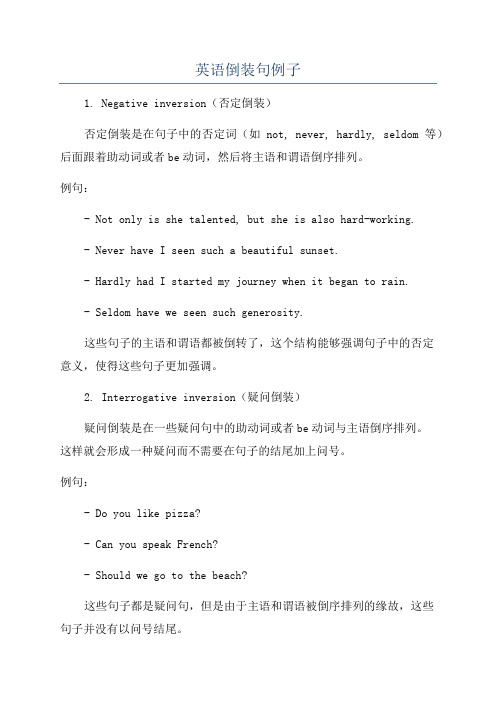
英语倒装句例子1. Negative inversion(否定倒装)否定倒装是在句子中的否定词(如not, never, hardly, seldom等)后面跟着助动词或者be动词,然后将主语和谓语倒序排列。
例句:- Not only is she talented, but she is also hard-working.- Never have I seen such a beautiful sunset.- Hardly had I started my journey when it began to rain.- Seldom have we seen such generosity.这些句子的主语和谓语都被倒转了,这个结构能够强调句子中的否定意义,使得这些句子更加强调。
2. Interrogative inversion(疑问倒装)疑问倒装是在一些疑问句中的助动词或者be动词与主语倒序排列。
这样就会形成一种疑问而不需要在句子的结尾加上问号。
例句:- Do you like pizza?- Can you speak French?- Should we go to the beach?这些句子都是疑问句,但是由于主语和谓语被倒序排列的缘故,这些句子并没有以问号结尾。
3. Adverbial inversion(副词倒装)副词倒装常常出现在一些表达地点或时间的副词(如here, there, now, then, on the front)在句首的情况下。
例句:- There went my chance.- Then came the storm.- On the front are the main headlines.这些句子中的副词被放在句子的最前面,并且主语和谓语被倒序排列了。
4. Emphatic inversion(强调倒装)强调倒装通常强调句子中的某个部分,被强调的部分通常在句首。
Chapter 24 Inversion(倒装)

注:但是当连接主语时不倒装
Neither he nor I has kept the secret.
Partial inversion
9. so…that/ such…that中 so+ adj./adv或 such…提前到句首时,此部分用倒装语序。如: So loudly did he speak that even people in the next room could hear him. So absurd did he look that everyone stared at him. In such a hurry did he leave that he forget to lock the door. Such a good voice did she have that she soon became a famous singer.
Full inversion
8. 在There be (exist, happen, live,
appear, lie, occur, seem, remain, stand等)句型中,构成完全倒装句。如:
There exist so many mistakes. There occurred a terrible accident at that time.
you with a cheque.
Partial inversion
3. 带有“not”的短语位于句首:not until, not a bit,
not once等 。如:
Not a bit am I afraid.
Not once did he talk to me.
什么是倒装句

什么是倒装句?倒装句(Inversion)是一种英语语法结构,它改变了正常的主语和谓语的语序,将谓语动词或助动词放在主语之前,或将全部谓语动词放在主语之前。
倒装句通常用于强调句子的某个部分、表示对比或疑问、或是在特定语法规则下使用。
以下是关于倒装句的详细解释和使用指导:1. 完全倒装:完全倒装是将谓语动词或助动词完全放在主语之前。
完全倒装常见的情况包括:-在以副词或介词短语开头的句子中。
例如:In the garden stood a beautiful tree.(花园里有一棵美丽的树。
)-在以表示否定的副词或短语开头的句子中。
例如:Never have I seen such a beautiful sunset.(我从未见过如此美丽的日落。
)-在以表语或地点状语开头的句子中。
例如:Here comes the bus.(车来了。
)2. 部分倒装:部分倒装是将助动词或情态动词放在主语之前,而将谓语动词保留在主语之后。
部分倒装常见的情况包括:-在以否定副词或短语开头,且没有表示否定的主语时。
例如:Not only did he study English, but he also learned French.(他不仅学习了英语,还学了法语。
)-在以表示条件的副词或短语开头的句子中。
例如:Should you need any assistance, please let me know.(如果你需要任何帮助,请告诉我。
)3. 疑问句倒装:疑问句倒装是将助动词或情态动词放在主语之前,以形成疑问句。
例如:Can you swim?(你会游泳吗?)这里的助动词"can"被放在主语"you"之前,形成疑问句。
4. 强调句倒装:强调句倒装是为了强调句子中的某个部分,将被强调的部分放在句首,并且将主语和谓语的位置进行倒装。
例如:It was Mary who won the competition.(是玛丽赢得了比赛。
英语 倒装句讲解

语,不可用倒装结构。
Not only you but also I am fond of
music.
6. 用于only开头的句子(only位于句首,
修饰副词、介词短语或状语从句)
Only after being asked three
times did he come to the
meeting.
部分倒装:NAOSHI
1.I was so interested in this video game that I didn’t notice my father was behind me. So interested was I…
2.Mr green is such a nice man that everyone likes him. Such a nice man is Mr green…
完全倒装:NAOSHI 1.所有地点+两个时间: here,there,now,then,up,down,in,out,away ,off… 2.谓语动词用一般现在时或一般过去时 3.主语是名词,而不是代词
NAOSHI 前置原则 1.although,though,even though,while 2.主+系+表结构 改:表+as/though+主+系
Here comes the bus.
Out rushed the puppy.
Away went the girl.
注意: 代词作主语时, 主谓语序不变。 Here it is. In he comes.
3. 当句首状语是表示地点的介词词组时, 也常引起全部倒装。
South of the city lies a big steel factory. From the valley came a frightening sound. Under the tree stands a little boy.
什么是倒装句

什么是倒装句?倒装句(Inversion)是英语中一种特殊的句子结构,其中谓语动词(或助动词)和主语的位置颠倒。
倒装句可以分为完全倒装和部分倒装两种形式。
1. 完全倒装:在完全倒装中,谓语动词(或助动词)直接放在主语之前。
- Never have I seen such a beautiful sunset.(我从未见过如此美丽的日落。
)- Not only does she play the piano, but she also sings.(她不仅弹钢琴,而且还唱歌。
)- On the table sits a cup of tea.(桌子上放着一杯茶。
)2. 部分倒装:在部分倒装中,只有谓语动词的一部分(如助动词或情态动词)放在主语之前,其他部分仍然位于其后。
- Can you swim?(你会游泳吗?)- Should you need any assistance, please let me know.(如果你需要任何帮助,请告诉我。
)- Rarely do I eat fast food.(我很少吃快餐。
)倒装句的使用会改变句子的语序,强调句子中的某个部分或在特定的语境中使用。
以下是一些常见的倒装句的情况:1. 在否定词或词组开头的句子中:- Never have I been so happy.(我从未如此快乐。
)- Under no circumstances should you give up.(在任何情况下,你都不应该放弃。
)2. 在表示地点或时间的副词短语开头的句子中:- Here comes the bus.(车来了。
)- In the distance stood a tall building.(远处矗立着一座高楼。
)3. 在表达强调的句子中:- Only when you work hard can you achieve success.(只有努力工作,你才能取得成功。
Inversion 倒装句

Inversion 倒装句在英语中,主语和谓语的语序通常的主语在前,谓语在后。
但有时为了强调某一部分,或适应一定的语法结构的需要,而把谓语的全部或一部分提到主语的前面,这种情况叫“倒装”(Inversion)。
一、基本结构:完全倒装: 谓语+ 主语eg. In came the headmaster.部分倒装: 助动词/情态动词/be动词+主语+ V.…eg. Nothing do I care in my life.二、倒装的目的1、语法要求:疑问句,there be, 祝愿句2、修辞要求:为了强调;为描写生动;为衔接上下文;为平衡句子三、语法详解一)部分倒装1、never, often, seldom, little, nowhere, not, hardly,scarcely 等词位于句首时a. Never have I seen him before.b. Seldom do we go out.c. Little does he know what trouble he is in.Exercises:1)We are going nowhere at the weekend.2)He did not make a single mistake.3)We often warned them not to do so.2、Only + 状语,位于句首Eg. [Only in this way] can you work out the problem. 条件状语修饰整句Exercise:4)He was able to get back home only when the war was over.3、No so oner…than…;Hardly …when…; Scarcely …when…:(一……就……)位于句首Eg. Hardly had they gone out of the classroom when it began to rain.Exercises:5)He had no sooner arrived there than he fell ill.6)She had scarcely fallen asleep when a knock at the door awaked her.4、not …until… 或so ….that...位于句首Eg. Not until yesterday did I know the news.So loudly did he speak that even people in the next room could hear him.Exercises:7)I did not begin to do my homework until my mother came back.5、Not only…but also…连接两个句子时Eg. Not only was there no electricity at that time but also (there was) no water in the area. Exercises:8)He is not only an actor but also a writer.6、so/neither/nor引起的句子表示前面所说的情况也适用于另一个人Eg. He likes rice very well. So do I.I have never been abroad. Neither has he.* It was cold yesterday. So it was.Exercises:9)We saw the film last week. They saw it, too.10)I didn’t read the notice on the blackboard. He didn’t either.7、含有NO的介词短语位于句首Eg. At no time will China be the first to use nuclear weapons.By no means can teaching be separated from practice.8、省略了if 的虚拟条件句:虚拟条件句的谓语动词如果是were, had, should 时,可省略if, 但其谓语须倒装。
高考英语倒装句

2. 用于“here (there, now, then) + 不及 物 动词 + 主语的句型中, 或以out, in, up, down, away 等副词开头的句子里面, 表示强调。 the bell. There goes Out rushed the children. Here comes Helen’s car. 名词 Away went the boy. In front of the house was a small garden.
3. No sooner„than„
一„„就„„
4. Hardly„when„
began to rain.
一„„就„„
4. Hardly had I left home when it
5. Neither„nor„
既不„„也不„„
5. Neither do I smoke nor do I drink.
(2) Hardly had I got out of the
house when it began to rain.
• *我很少去看电 影. • I seldom go to the cinema. • Seldom do I go to the cinema.
1. Not only„but also„
ask 作引用动词
补充结论:
宾语 引用动词有______时,不用倒装。
Long long ago, there was a hill in China. On the hill stood a temple. In the temple lived an old monk ,the old monk was telling stories to a little monk. What stories was he telling?
高中英语语法专讲 特殊句式之倒装句Inversion

高中英语语法专讲特殊句式之倒装句Inversion 英语句子通常有两种语序:一种主语在前,谓语在后,称为正常语序,另一种谓语在前,主语在后,称为倒装语序。
之所以出现倒装,一方面是因为语法结构的需要,另一方面为了强调或修饰,有时两种原因兼有之。
倒装句分为全部倒装和部分倒装。
另外,英语句子的倒装一是由于语法结构的需要而进行的倒装,二是由于修辞的需要而进行的倒装。
前一种情况称之为语法倒装 ,倒装是必须的,否则就会出现语法错误;后一种情况称之为修辞倒装 ,倒装是选择性的,倒装与否只会产生表达效果上的差异。
一、【全部倒装】把整个谓语部分放在主语之前。
注意:谓语动词的数要与后面的主语保持一致。
1、用于地点副词here, there,方位副词out, in, up, down及时间副词now, then等开头,谓语动词为be, stand, lie, come, go, fall等的句子里,以示强调。
【语法倒装】There goes the bell. Look! Here comes the bus.这种倒装要求:主语必须是名词。
而当主语是代词时,主语和谓语语序不变。
Here it is. Here you are. Away he went. Here we go.注意:这类倒装句式一般只用一般现在时和一般过去时时态。
Here comes Miss Young. Out rushed the boys.[小练]汉翻英1)紧接着了三天大雨。
Then followed three days of heavy rain.2)我们期盼已久的时刻来了!Now comes the hour we have been looking forward to.2、当表示地点的介词短语放句首时。
注意:谓语多为be, lie, sit, stand, come, walk等不及物动词且这类倒装句式一般只用一般现在时和一般过去时时态。
英语倒装句

英语倒装句英语倒装句(Inversion)主语和谓语是句子的核心,它们之间有两种语序:一是主语在谓语之前称为自然语序(Natural Order);二是主语在谓语之后则称为倒装语序(Inverted Order)。
而倒装语序中又有完全倒装(Full Inversion)和部分倒装(Partial Inversion)完全倒装(Full Inversion):又称"全部倒装",是指将句子中的谓语动词全部置于主语之前。
此结构通常只用与一般现在时和一般过去时。
部分倒装(Partial Inversion):指将谓语的一部分如助动词或情态动词倒装至主语之前,而谓语动词无变化。
如果句中的谓语没有助动词或情态动词,则需添加助动词do, does或did,并将其置于主语之前。
英语句子的倒装一是由于语法结构的需要而进行的倒装,二是由于修辞的需要而进行的倒装。
前一种情况,倒装是必须的,否则就会出现语法错误;后一种情况,倒装是选择性的,倒装与否只会产生表达效果上的差异。
语义解析一、表示强调:倒装句最突出、最常见的修辞效果就是强调,其表现形式如下:1.only +状语或状语从句置于句首,句子用部分倒装。
例子:Only in this way can you solve this problem.只有用这种方法,你才可以解决这个问题。
Only after he had spoken out the word did he realize he had made a big mistake. 只有当他已经说出那个字后才意识到自己犯了个大错误。
2. hardly,in no way,little,scarcely,seldom,never,no more, no longer,not, not only, no sooner, not only … (but also),not until…等具有否定意义的词或词组位于句首,句子用部分倒装。
倒装句(Inversion)

倒装句(Inversion)一.倒装分为全部倒装和部分倒装。
谓语的全部放在主语之前,叫全部倒装;谓语动词不放在主语之前,而借助于助动词、情态动词等放在主语之前引起倒装,叫部分倒装,也叫局部倒装。
二.倒装的原因:一是语法结构的需要(如某些疑问句);一是为了强调。
三.用法:1.以here, there或out ,in ,up ,down ,away等副词开头的句子里,以示强调。
Eg : A : There goes the bell . B: Here comes the bus .C: Out rushed the children . D: Away went the boy .注:主语是人称代词时,主语和谓语的语序不变。
Eg: A: Here it is !B : Away he went .2. Only 修饰的副词、介词短语或状语从句放句首时。
Eg: (1) Only then did I realize that I was wrong .(2) Only in this way can you learn from your mistakes .(3) Only when the war was overin 1918was he able to gethappily back to work .3. 含有否定意义的副词或连词放句首时。
(1)never / seldom / littleeg : A. Never shall I forget it .B. Never have I heard such astrange story .C. Seldom did I hear such astrange story .D. Little does he care aboutwhat others think .(2)not / not until / not only ---butalso / neither--- noreg: A. Not a single mistake did he make .B. Not until midnight did the rain stop .C. Not only is he a worker , but also he is a writer .D. Neither is he a worker , nor is he a writer .(3)Hardly ---when / Scarcely---when / No sooner---thanEg: A. Hardly / Scarcely had Ireached the bus stopwhen the bus started .B. No sooner had I returned home than the telephone rang .4.副词so 放句首,表示前面所说的情况也适用于另一人或物。
《英语语法》 Inversion sentence 倒装句

2.Here you are
3.Away they went.
倒装的具体用法
完全倒装 03
there be 句型
在There+助动词/情态动词+be+主语+地点/时间的句型中,主
感谢您下载包图网平台上提供的PPT作品,为了您和包图网以及原创作者的利益,请勿复制、传播、销售,否则将承担法律责任!包图网将对作品进行维权,按照传播下载次数进行十倍的索取赔偿!
2.There happened to be a friend of mine in the park.碰 巧在公园里有我的一个朋友。
倒装的具体用法
完全倒装 04
当直接引语全部或部分置于句首时,引用动词和她的主语(主
语是名词)需要倒装。
感谢您下载包图网平台上提供的PPT作品,为了您和包图网以及原创作者的利益,请勿复制、传播、销售,否则将承担法律责任!包图网将对作品进行维权,按照传播下载次数进行十倍的索取赔偿!
《英语语法》
Inversion 感谢您下载包图网平台上提供的PPT作品,为了您和包图网以及原创作者的利益,请勿复制、传播、销售,否则将承担法律责任!包图网将对作品进行维权,按照传播下载次数进行十倍的索取赔偿!
sentence
倒装句
1 倒装的定义
感谢您下载包图网平台上提供的PPT作品,为了您和包图网以及原创作者的利益,请勿复制、传播、销售,否则将承担法律责任!包图网将对作品进行维权,按照传播下载次数进行十倍的索取赔偿!
2.In the front of classroom
stands
our
English
teacher.
3.In the front of classroom does she stand .
英语倒装句的作用与用法
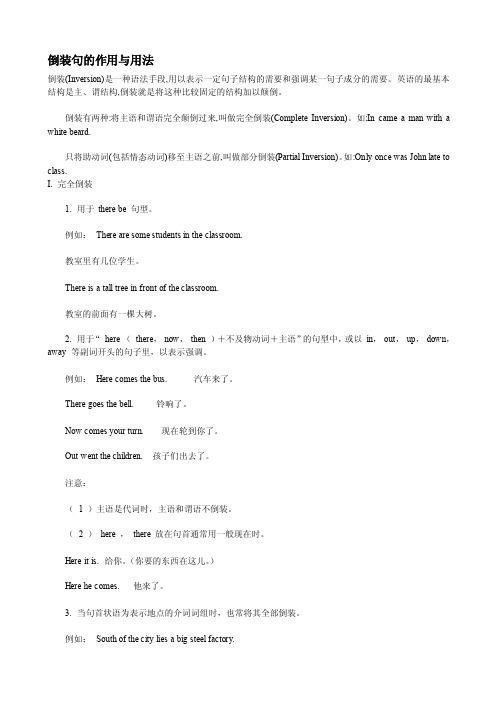
倒装句的作用与用法倒装(Inversion)是一种语法手段,用以表示一定句子结构的需要和强调某一句子成分的需要。
英语的最基本结构是主、谓结构,倒装就是将这种比较固定的结构加以颠倒。
倒装有两种:将主语和谓语完全颠倒过来,叫做完全倒装(Complete Inversion)。
如:In came a man with a white beard.只将助动词(包括情态动词)移至主语之前,叫做部分倒装(Partial Inversion)。
如:Only once was John late to class.I. 完全倒装1. 用于there be 句型。
例如:There are some students in the classroom.教室里有几位学生。
There is a tall tree in front of the classroom.教室的前面有一棵大树。
2. 用于“here (there,now,then )+不及物动词+主语”的句型中,或以in,out,up,down,away 等副词开头的句子里,以表示强调。
例如:Here comes the bus. 汽车来了。
There goes the bell. 铃响了。
Now comes your turn. 现在轮到你了。
Out went the children. 孩子们出去了。
注意:( 1 )主语是代词时,主语和谓语不倒装。
( 2 )here ,there 放在句首通常用一般现在时。
Here it is. 给你。
(你要的东西在这儿。
)Here he comes. 他来了。
3. 当句首状语为表示地点的介词词组时,也常将其全部倒装。
例如:South of the city lies a big steel factory.城市南边有一家大型钢厂。
From the valley came a frightening sound.从山谷里传来了可怕的声音。
倒装句及练习题
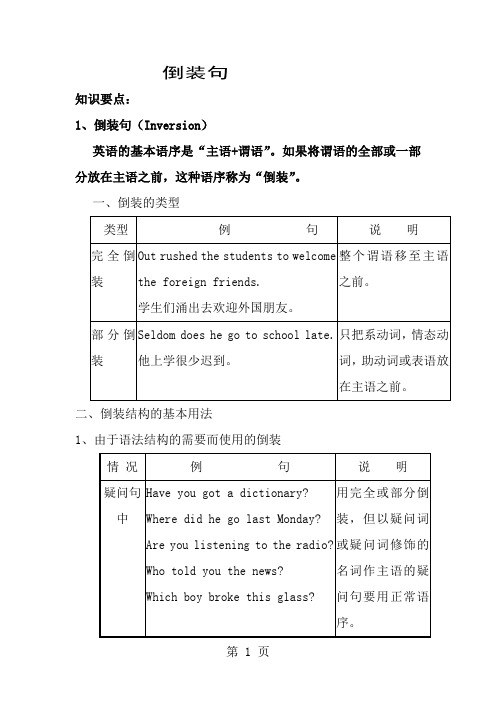
倒装句知识要点:1、倒装句(Inversion)英语的基本语序是“主语+谓语”。
如果将谓语的全部或一部分放在主语之前,这种语序称为“倒装”。
一、倒装的类型二、倒装结构的基本用法1、由于语法结构的需要而使用的倒装2、为了加强语气而使用的倒装。
(使句子更加流畅,更加生动)【专项训练】1、 that we all went out, lying in the sun.A.The weather so fine was B.So fine was the weatherC.So the weather was fine D.So was fine weather2、Under his arm a pair of shoes which he had bought from the shop a few days before.A.is B.are C.was D.were3、 who had arrested him three times for carryingdrugs.A.Before George stood the policeman B.Before George the policeman stoodC.Before the policeman stood George D.Before George did the policeman4、Then we had been looking forward to .A.came the hour B.the hour came C.comes the hour D.the hour is coming5、Only when he started to explain the reason for this.A.she realized B.did she realize C.she had realized D.had she realized6、 succeed in doing anything.A.Only by working hard we can B.By only working hard we canC.Only by working hard can we D.Only we can by working hard7、Not for a moment the truth of your story.A.he has doubted B.he doubts C.did he doubt D.he did doubt8、Nowhere else in the world cheaper tailoring than in Hong Kong.A.a tourist can find B.can a tourist find C.a tourist will find D.a tourist has found9、Hardly when the bus suddenly pulled away.A.they had got to the bus-stop B.they got to the bus-stopC.did they get to the bus-stop D.had they got to the bus -stop10、Mary doesn’t speak French, and does Joan.A.not B.neither C.either D.so 11、—Do you know Jim quarrelled with his brother? —I don’t know, .A.nor don’t I care B.nor do I care C.I don’t care neither D.I don’t care also12、Not until the early years of the 19th century what heat is.A.man did know B.man knew C.didn’t man know D.did man know13、After that we never saw her again nor from her.A.did we hear B.we heard C.had we heard D.we have heard14、John won the first prize in the contest. .A.So he did. B.So did he. C.So he did, too. D.So did he, too.15、,he doesn’t study well.A.As he is clever B.He is as clever C.Clever as he is D.As clever he is16、You can never use my tape recorder. time should youtouch that machine.A.At no B.At any C.Any D.No17、Scarcely the room the phone rang.A.I had entered…whenB.Had I entered…thenC.had I entered…whenD.have I entered…when18、Only save his life.A.can the doctor B.the doctor can C.will the doctor D.could the doctor19、Hardly anybody the boy , because he is rude.A.does like B.likes C.do like D.like 20、So well that the teacher praised her.A.she had done her homework B.her homework had been doneC.did she do her homework D.she did her homework 21、Only when to know him will you get along with him.A.do you come B.will you come C.you come D.you will come22、Out , gun in hand.A.did he rush B.rushed he C.he rushed D.had he rushed23、He had promised me to come to the party ,and .A.so did he B.so he did C.so he would D.so would he24、Into the sky the light blue smoke.A.went up B.up went C.did go upD.had gone up25、Little about his own life at the meeting.A.did he talk B.he talked C.he was talking D.had he talked26、Under no circumstances first use nuclear weapons.A.will China B.China will C.does ChinaD.do China27、 taken that examination, she could have passed it .A.Were she B.Had she be able to C.If she would have D.Had she28、 tomorrow , we would put off the match till next Monday.A.Should it rained B.Were it to rain C.If it would rain D.Had it rained29、Look, here .A.Mr. Brown comes B.does Mr. Brown come C.comes Mr. Brown D.Mr. Brown has come30、Often us good advice.A.did she give B.she did give C.she gave D.she has given31、Not until I began to work how much time I had wasted.A.didn’t I r ealize B.did I realize C.I didn’trealize D.I realize32、Little about his own safety , though he was ingreat danger himself.A.does he care B.did he care C.he cares D.hecared33、 began our new lesson.A.But B.Thus C.Such D.So that34、By no means look down upon the poor.A.we should B.we should not C.do we D.should we35、Only when 30 years old to learn English.A.was he , did he begin B.he was , he beganC.was he , he began D.he was ,did hebegin36、Not once their plan.A.did they change B.they changed C.changedthey D.they did changed37、“It’s very hot today.”“ .”A.So it is B.So is it C.So does itD.So it does38、A fish needs water and without water it will die.A.So does a man B.So will a man C.So it is with aman D.So is it with a man39、They arrived at the farmhouse, in front ofwhich .A.sat a small boy B.a small boy sat C.is sitting asmall boy D.a small boy sitting40、Society has changed and in it .A.so have the people B.so the people haveC.the peoplehave soD.have the people soⅡ、改错41、Only when was he 50 years old did he begin to learn French.42、Little she knew Tom was was badly ill .43、Turn to the right and there are you.44、And all around the fox in a circle was dogs.45、—You can learn English well.—So can we.46、I dare climb this tall tree, but do you?47、Not once he kept his promise.48、Many a time he has given us some good advice.49、Such a noise there was that I couldn’t work in the room.50、Only does my mother understand me.14.8 倒装练习1. Only when you have obtained sufficient data ______come to a sound conclusion.a. can youb. you canc. would youd. you would2. ______ that this region was so rich in natural resources.a. Little he knewb. Little did he knowa. Little he did know d. Little he had known3. Never again ______ political office after his 1928 defeat for the presidency.a. Alfred E. Smith seriously soughtb. seriously Alfred E. Smith soughtc. when did Alfred E. Smith seriously seekd. did AlfredE. Smith seriously seek4. Only in recent years ______ begun to realize that wild dogs, kept within bounds, often do more good than harm.a. people haveb. since people havec. have peopled. people who have5. _______, we were not going to make any concessions tohis unreasonable demands.a. What may comeb. Come what mayc. May what comed. What come6. Not until I shouted at the top of my voice ______ his head.a. that he turnedb. did he turnc. he didn’t turnd. he had turned7. ______ received law degrees as today.a. Never so women haveb. The women aren’t everc. Women who have neverd. Never have so many women8. Heat does not travel by convection in solid, becausethe solid does not move, ______.a. so does a liquidb. so a liquid doesc. as doesa liquid d. so is a liquid9. On no account ______ to anyone.a. my name must be mentionedb. must my name mentionc. must my name be mentionedd. my name must mention10. ______ that they may eventually reduce the amount of labor needed on construction sites by 90 percent.a. Such construction robots are cleverb. So clever the construction robots arec. So clever are the construction robotsd. Such clever construction robots are11. ______ do we go for picnics.a. Certainlyb. Sometimesc. Seldomd. Once12. ______ is it only the ignorant andill-educated person who has such faith in the bottle of medicine.a. Eitherb. Oftenc. Nord. Usually13. Her answer is not acceptable, and ______.a. neither am Ib. either is minec. neither is mined. mine is neither14. ______, I must do another experiment.a. Be it ever so lateb. It is ever so latec. It be everso late d. So late it be ever15. So fast ______ that it is difficult for us toimagine its speed.a. light travelb. travels the lightc. do light traveld. does light travel16. A sneeze cannot be performed voluntarily,______ be easily suppressed.a. nor it canb. nor can itc. it cannotd. and cannot it17. ______ notebook and report that I promised you last week.a. Here is theb. Here are thec. Is here thed. Are here the18. ______ a little more time to think, he might have acted more sensibly.a. If he tookb. If he has takenc. had he takend. Should he take19. Beneath our feet ______ that our life dependson for food and clothing.a. the earth layb. the earth liesc. lie the earthd. lies the earth20. ______ the beginning of the 19th century did scientists know that all matter is made up of atoms.a. Atb. Byc. Up tod. Not until21. Hardly ______ he got out of the court ______ the reporters raised a lot of questions to him.a. had … whenb. had…thanc. did…whend. has…than22. Among these books ______ a dictionary that his father gave him as a birthday present.a. have includedb. is includedc. has includedd. are included23. No longer are contributions to computer technology confined to any one country; ______ is this more true than in Europe.a. nowhereb. hardlyc. littled. seldom24. Important ______ his discovery was, it was regarded as a matter of no account in his time.a. tob. forc. asd. although25. According to the periodic table, ______ still some elements undiscovered.a. there seem to beb. it seemsc. it seems to bed. here seems26. Here ______ you want to see.a. the manager comesb. comes the managerc. comes a managerd. is coming a manager27. Barry can hardly drive a car, ______.a. so can’t Mollyb. can’t Molly eitherc. Molly can’t tood. neither can Molly28. _______ for the leadership of the Party, we should not have succeeded.a. Had not it beenb. Had it not beenc. There wasd. Is there29. ______ no air or water, there would be no lifein the world.a. Were thereb. There arec. There wasd. Is there30. Not only ______ the data fed into it, but it can also analyze them.a. the computer can memorizeb. can the computer memorizec. do the computer memorized. can memorize the computer31. Not once ______ his view of life.a. did the gentleman mentionb. the gentleman mentioned thatc. the gentleman mentionedd. does gentleman mentioned32. By no means ______ their own language well.a. it is true that all English people knowb. is it true that do all English people knowc. it is true that do all English people knowd. is it true that all English people know33. The molecules of gases move more freely than______.a. do liquids and solidsb. liquids and solids doc. do those of liquids and solidsd. those do of liquids and solids34. The world’s birth rates are on a decline and______ are the death rates.a. sob. alsoc. tood. the same35. _____ is the volume of chemical goods.a. Constantly growing toob. Too constantly growingc. Growing constant tod. Too growing constant36. Many a time _______ me with my English study.a. have he helpedb. has he helpedc. he have helpedd. did he have helped37. Typical of the new type of young people ______, who set a shining example to the whole nation.a. was Lei Fengb. Were Lei Fengc. Lei Feng wasd. Lei Feng were38. What Mr. Smith did was important , but ______.a. more important the way of he did things wasb. the way of he did things was more importantc. more important was the way he did thingsd. more important the way were he did things39. She didn’t want to buy it, ______.a. however good was itb. however good it wasc. for how good might it bed. for how good it mightbe40. ______ , it is always possible to find out its volume.a. Whatever the shape of a body may beb. The shape of a body may be whateverc. May whatever the shape of a body bed. Whatever may the shape of a body be41.I won’t pay $20 for the coat; it’s not worth ______.a. all that muchb. that much allc. that all muchd. much all that42. Hot air accompanied by high relative humidity feels warmer than ______.a. is it actuallyb. it actually isc. actually itis d. actually is it43. Qingdao is usually cool in summer, but Nanjing ______.a. is rarelyb. scarcely isc. hardly isd. rarely is44. David, something important has happened. I wish to ______.a. talk it over with youb. talk over itc. talk overd. talk you over it45. __, more than 200 houses and buildings are heated by solar energy, not to mention the big cities in the region. a. Alone in the small town b. In the small alone townc. In the small town aloned. In the alone small town46. Geysers are found new near rivers and lakes, where water drains through the soil ______.a. surface below the deepb. deep below the surfacec. the deep below surfaced. the deep surface below47.The wallflower __ because its weak stems often grow on walls and along stony cliffs for support.a. so called isb. so is calledc. is so calledd. called is so48. The history of painting is a fascination chainof evens that probably began with ______.a. ever made the very first picturesb. the ever made very first picturesc. the very first ever made picturesd. the very first pictures ever made49. On the side of the hill, there is ______ which was once the entrance to a gold mine.a. a deep hole in groundb. a hole deep in groundc. a deep hole in the ground a deep in the ground hole50. Will the boy who has taken my pen brine ______.a. back to meb. it back to mec. back it to med.it to me back【答案】:1、B2、C3、A4、A5、B6、C7、C 8、B 9、D 10、B 11、B 12、D13、A 14、A 15、C 16、A 17、C 18、B19、B 20、C 21、C 22、C 23、B 24、A25、A 26、A 27、D 28、B 29、C 30、A31、B 32、B 33、B 34、D 35、D 36、A37、A 38、C 39、A 40、A41、was he —he was 倒装主句不倒装从句。
什么是倒装句
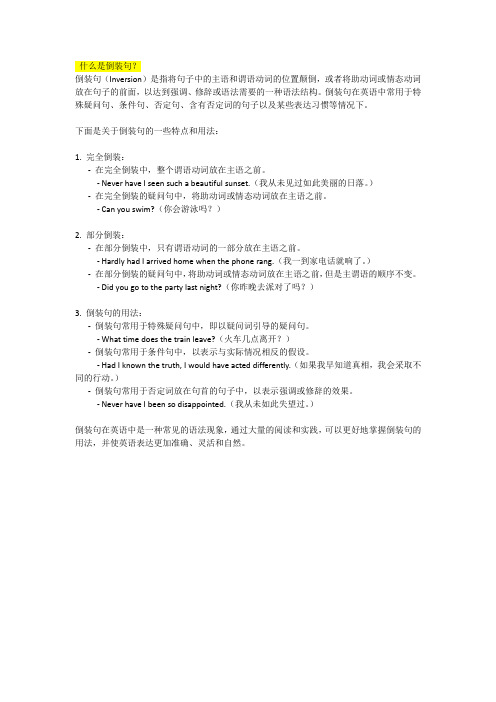
什么是倒装句?倒装句(Inversion)是指将句子中的主语和谓语动词的位置颠倒,或者将助动词或情态动词放在句子的前面,以达到强调、修辞或语法需要的一种语法结构。
倒装句在英语中常用于特殊疑问句、条件句、否定句、含有否定词的句子以及某些表达习惯等情况下。
下面是关于倒装句的一些特点和用法:1. 完全倒装:-在完全倒装中,整个谓语动词放在主语之前。
- Never have I seen such a beautiful sunset.(我从未见过如此美丽的日落。
)-在完全倒装的疑问句中,将助动词或情态动词放在主语之前。
- Can you swim?(你会游泳吗?)2. 部分倒装:-在部分倒装中,只有谓语动词的一部分放在主语之前。
- Hardly had I arrived home when the phone rang.(我一到家电话就响了。
)-在部分倒装的疑问句中,将助动词或情态动词放在主语之前,但是主谓语的顺序不变。
- Did you go to the party last night?(你昨晚去派对了吗?)3. 倒装句的用法:-倒装句常用于特殊疑问句中,即以疑问词引导的疑问句。
- What time does the train leave?(火车几点离开?)-倒装句常用于条件句中,以表示与实际情况相反的假设。
- Had I known the truth, I would have acted differently.(如果我早知道真相,我会采取不同的行动。
)-倒装句常用于否定词放在句首的句子中,以表示强调或修辞的效果。
- Never have I been so disappointed.(我从未如此失望过。
)倒装句在英语中是一种常见的语法现象,通过大量的阅读和实践,可以更好地掌握倒装句的用法,并使英语表达更加准确、灵活和自然。
- 1、下载文档前请自行甄别文档内容的完整性,平台不提供额外的编辑、内容补充、找答案等附加服务。
- 2、"仅部分预览"的文档,不可在线预览部分如存在完整性等问题,可反馈申请退款(可完整预览的文档不适用该条件!)。
- 3、如文档侵犯您的权益,请联系客服反馈,我们会尽快为您处理(人工客服工作时间:9:00-18:30)。
Inversion倒装句
一、概述:
英语句子的基本语序是主语在前,谓语动词在后(the natural order),当语序颠倒时就成了倒装结构(the inverted order)。
把谓语的全部放在主语之前称为完全倒装;而只把助动词或情态动词放在主语之前,则称为部分倒装。
倒装的分类
1 部分倒装-主语与助动词/情态动词/系动词倒装
结构:助动词/情态动词+ 主语+谓语动词
Never have I heard such a thing.
= I have never heard such a thing.
2 全部倒装–主语与谓语动词倒装
结构:谓语动词+ 主语
Down fell the rain.
= The rain fell down
二.全部倒装句
1. here, there, now, then, thus,out,away, up, down等表示时间地点方向的副词置于句首, 谓语动词常用be, come, go, lie, run。
当其主语为名词时,通常要使用倒装。
例如:
a. There goes the bell.
b. Then came the chairman.
c. Here is your letter.
d. Away went the boy to the school!
e. Off goes the woman!
注意:上述全部倒装的句型结构的主语必须是名词,如果主语是人称代词则不能倒装。
Here he comes.
Away they went.
2. 以引导词there开头的句子,须使用倒装结构,除there be 外还有there Live / stand / lie / exist等。
例如:
a. There are three books on the desk.
b. There lived an old fisherman near the sea.
c. There stands a tall building in the centre of the town.
3.so, neither, nor表示前面所述一件事也适合另一个人或物时.So用于肯定句, neither/nor 用于否定句.
a. Tom can speak French. So can Jack.
b. If you don't go, neither will I.
注意:1) 当so引出的句子用以对上文内容加以证实或肯定时,不可用倒装结构。
意为"的确如此"。
Tom asked me to go to play football and so I did.
---It‘s raining hard.
---So it is.
2)但如果上文所述两件事也适合另一个人或物,就用So it is /was with sb.或It is/was the same with sb. Marx was born in Germany and German was his native language. So it was with Engls.
4. 介词短语做地点状语放在句首
eg. a. In the cottage lives a family of six.
b. Near the bridge was an old cottage.
c. In front of the house sat a little boy.
三.部分倒装句
1. 疑问句
a.Have you seen the film?
b.When are we going to drink to your happiness?
注意:如疑问词在句中做主语,则用自然语序。
c. Who is your sister?
d.What is our work?
2. so/such...that的so/such位于句首时,
eg. a. So loudly did the students read that people could hear them out in the street.
b. So small were the words that he could hardly see them.
c. Such a famous man is he that everyone wants to take a photo with him.
3. 否定意义的副词或短语位于句首时,常见的有:
in no way, not only…but also, never, little, rarely, seldom, hardly... When, no sooner…than, scar cely…when, in no case, not until (当Not until引出主从复合句,主句倒装,从句不倒装。
)
eg. a. Not until the child fell asleep did the mother leave the room.
b. Hardly can I follow you.
c. Seldom do I visit USA.
d. Never have I seen such a performance .
注意:如否定词不在句首不倒装。
e. I have never seen such a performance.
f. The mother didn't leave the room until the child fell asleep.
4.在虚拟语气条件句中从句谓语动词有were, had, should等词,可将if 省略,把were, had, should 移到主语之前,采取部分倒装。
a. Were I you, I would not do such a thing.
= If I were you, I would not do such a thing.
b. Would the machine break down again, send it back to us.
= If the machine would break down again, send it back to us.
c. Had you worked harder, you would have passe
d.
= If you had worked harder, you would have passed.
5. 有些表示“感叹、祝愿”等语气的句子,也可使用倒装结构
eg. a. Isn‘t it cold!
天气真冷!
b. May both be happy!
祝你们两位幸福!
c. May God bless you.
愿上帝赐福于你。
d. Long live the king
国王万岁!
6. Only 位于句首,强调句子的状语时。
eg. a. Only then did I fully understand what my father said.
只有到那时,我才充分理解我父亲讲的话.
b. Only when I left school did I realize how important study is.
只有当我离开学校时,我才意识到学习有多么重要。
注意:如果only强调的是句子主语时。
不倒装。
eg. Only he can help us.
四.其他倒装的情况
1.在"such+be+主语"的结构中。
Such was the story he told me.
= The story he told me was such.
Such was what Peter spoke at the meeting.
=What Peter spoke at the meeting was such.
2. 由as/though引导的让步状语从句中,其基本句式为:"形容词/副词/名词+as+主语+谓语"或"动词原形+as+主语+情态动词/助动词"。
Child as he is, he knows a lot of English.
= As/Though he is a child, ……
Old as they were, they stuck to working.
= As/Though they were old,……
Hard as he tried, he couldn't lift the stone.
-As/Though he tried hard,……
Try as I might, I couldn't lift the stone.
-As/Though I might try, ……。
